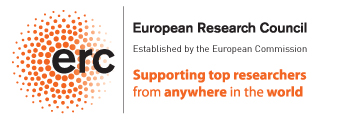CRASSH is delighted to share news of two recent European Research Council-funded projects, which will be housed in the Centre until 2022.
Qualitative and Quantitative Social Science: Unifying the Logic of Causal Inference? and The Global as ARTEFACT: Understanding the Patterns of Global Political History Through an Anthropology of Knowledge – The Case of Agriculture in Four Global Systems from the Neolithic to the Present are both Horizon 2020 ERC projects running from 2017 until 2022. Led by Principal investigators Dr Christopher Clarke and Dr Inanna Hamati-Ataya respectively, both projects will run wide-ranging programmes of events and research activities that cross disciplines and forge fresh links between academic and non-academic collaborators.
ARTEFACT aims to offer a novel understanding and theorisation of ‘the global’ by examining the constitution and transformation of global political structures from the anthropological perspective of humankind’s epistemic development. To do so it takes as a case-study the emergence and diffusion of four major global agricultural revolutions of the ancient, medieval, modern, and contemporary eras, focusing on the patterns and pathways characterising the co-constitution and co-evolution of global and international socio-political and epistemic structures and processes in each of, and across, these major historical configurations.
An important feature of the ARTEFACT project is the launch of the Centre for Global Knowledge Studies. GloKnoS is concerned with the past and contemporary global production, diffusion, exchange, and use of human knowledges across their different cultural configurations and ideational-material manifestations. It will aim to foster advanced interdisciplinary research and pedagogical training in Global Epistemics, as well as cross-sectorial exchanges and initiatives, through a global network of academic and non-academic collaborations and activities, an institutional and virtual infrastructure, and a publishing outlet dedicated to the free diffusion of its research outputs.
QUALITY focuses its attention on the development and application of good public policy, which should make society healthier, happier, safer, and more productive. Social scientists rely on a wide variety of methods to help, and policymakers try to weigh up all this ‘quantitative’ and ‘qualitative’ evidence in order to judge the likely effects of a policy. However, it’s currently unclear how to weigh up the evidence from multiple qualitative studies, either on their own or together with quantitative studies. This exposes one’s causal judgements to an increased risk of error, as it does any policies based upon these judgements. QUALITY aims to solve this problem by bringing together cutting-edge work in epistemology with the expertise of leading social scientists, in order to analyse some prominent qualitative studies in sociology and political science, and contrast them with some prominent quantitative studies based on econometrics. This will then determine whether there is, despite their differences, a handful of basic heuristics for causal inference that underlie both types of approach.
• Both projects are currently advertising for Postdoctoral Research Associates – if you are interested in becoming part of CRASSH please visit our vacancies page.
QUALITY is funded by the European Research Council under the European Union’s Horizon 2020 Framework Programme for Research and Innovation (ERC grant agreement no. 715530).
ARTEFACT is funded by the European Research Council under the European Union’s Horizon 2020 Framework Programme for Research and Innovation (ERC grant agreement no. 724451).



